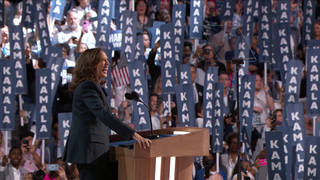
Vice President Kamala Harris formally accepted the Democratic presidential nomination Thursday night at the Democratic National Convention in Chicago, making history as the first Black woman and first person of South Asian descent to be nominated for president by a major party. Her ascent to the top of the Democratic Party comes just over a month after President Biden dropped out of the race. We play excerpts from her speech and speak with historian Barbara Ransby, who says that while the nomination “breaks a barrier,” it’s important to note the “contradictions,” as well. ”Yes, it breaks barriers. Yes, it is a historic moment in a certain sense. But we have to also talk about the gravity of this moment and the politics that Kamala Harris brings with her,” says Ransby, who criticizes Harris for her pro-Israel policy and for refusing to let Palestinian Americans address the convention. “I was glad to hear her mention the suffering of the Palestinian people, but, of course, it didn’t ring true. It rang a little bit hollow, because the Biden administration could stop much of that suffering by not sending 2,000-pound bombs and $3 billion a year to the Israeli government.”

 2 months ago
13
2 months ago
13


